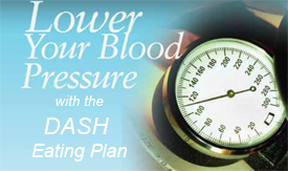DASH Diet

Dietary Approaches to Stop Hypertension (DASH) is a flexible and balanced eating plan. DASH was one of three eating plans that were compared in research studies sponsored by the National Heart, Lung, and Blood Institute (NHLBI).
The goal of this research was to study the effects of diet on high blood pressure. The results showed that the DASH eating plan lowers blood pressure. The plan:
Download the DASH diet program
The goal of this research was to study the effects of diet on high blood pressure. The results showed that the DASH eating plan lowers blood pressure. The plan:
- Is low in saturated fat, cholesterol, and total fat
- Focuses on fruits, vegetables, and fat-free or low-fat dairy products
- Is rich in whole grains, fish, poultry, beans, seeds, and nuts
- Contains fewer sweets, added sugars and sugary beverages, and red meats than the typical American diet
Download the DASH diet program